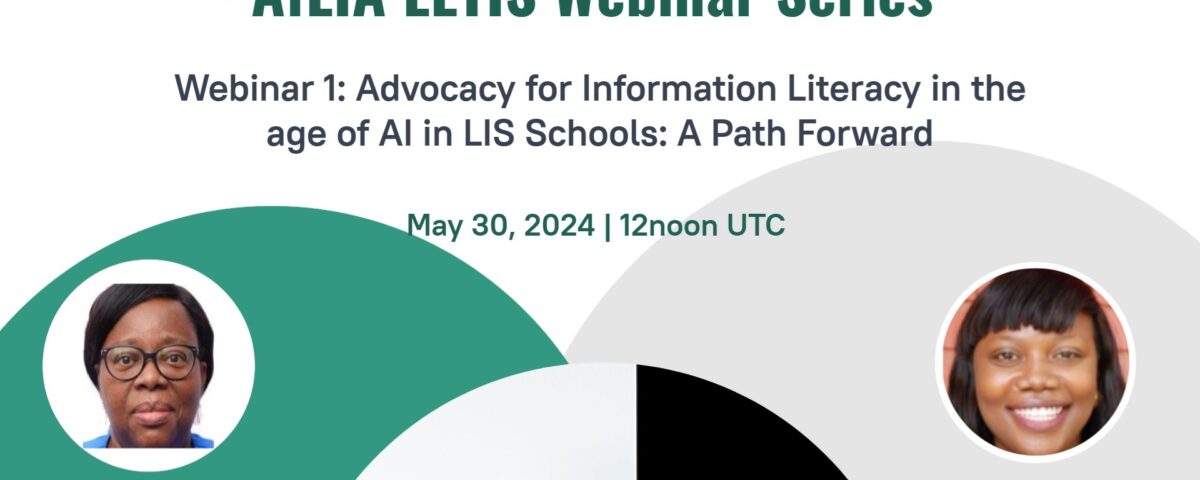Webinar: Advocacy for Information Literacy in the age of AI in LIS Schools: A Path Forward

10 MAY 2023
Overview
As Artificial Intelligence (AI) continues to influence all spheres of society and permeates every aspect of individuals in varied professions, the importance of information literacy cannot be overemphasized especially for the Library and Information Science (LIS) profession. Certainly, LIS schools across the globe continue to play a crucial role in shaping the next generation of information professionals who will navigate this evolving landscape. Thus, today, it has become more crucial than ever to advocate for more robust information literacy programs within LIS schools. Indeed, Information literacy, the ability to access, evaluate, and effectively use information, is essential for navigating the complexities of the digital age, particularly in the context of AI-driven information systems.
Nevertheless, AI has reshaped the information landscape, posing both challenges and opportunities for information professionals. Hence, recognizing its importance and hurdles, and advocating for the integration of AI literacy into the LIS curricula to ensure that graduates possess the necessary skills to navigate the complexities of the AI-driven information environments responsibly, is very critical.
Undeniably, apart from collecting, and preserving information, LIS professionals are tasked with managing and disseminating vast amounts of information, much of which is influenced by AI algorithms. Consequently, without the requisite knowledge in information literacy, LIS students’ risk being unprepared to critically assess the reliability, bias, and ethical implications of AI-generated content. The purpose of this webinar, therefore, is to affirm the necessity of advocating for Information Literacy in response to the rise of AI in LIS schools and propose some strategies for optimizing information literacy education within LIS curricula in the path forward.
Target audience
- LIS Educators
- Librarians
- Archivists
- Museum professionals
- Students
Date – Thursday, 30th May 2024
Time – 12 noon UTC | 1pm WAT | 2pm CAT/SAST | 3pm EAT
Registration
Click on the button below to register.
Kindly note that once you register, you will receive reminders about the event.
Resource person

Perpetua Sekyiwa Dadzie is an Associate Professor of Information Science at the Department of Information Studies, University of Ghana. She was the University Librarian from 2016-2021, Head of Department (Information Studies 2013-2015), Chairperson, Radio Univers (2014-2018), Chair of the College of Education Appointment Committee for Senior/Junior Staff (2016-2021).
Prof Dadzie also served two terms as President of the Ghana Library Association from 2012 -2016 and was also a member of the IFLA Africa section Committee from 2015-2017. Prof. Dadzie currently serves on the Academic Board, Graduate Studies Board and Joint Examiners Board. She is the current Managing Editor of the Ghana Library Journal and has several high impact publications to her credit in the areas of Information Sources and Literacy, Marketing of Information Services and Public Relations, and the UN 2030 Agenda.
Moderator

Dr. Monica Danquah is a Senior Lecturer at the Department of Information Studies, University of Ghana. She is the Editor-in-Chief of the Ghana Library Journal, and has over the years served as reviewer for a number of local and international journals. She is currently the Chair of the ICT and E-resources working Group for the Consortium of Academic and research libraries in Ghana, and Chair of the Festschrift committee of the Ghana Library Association. She is also the Public Relations Officer and a member of the Newsletter management team for AfLIA’s Library Education and Training Institutions Section (LETIS).
She has currently been appointed as the Lead for the Team working on the Global Advocacy Priority around the SDGs for the IFLA Regional Division Committee standing Committee for Sub-Saharan Africa (IFLA-RDS SSA). Her areas of academic interest include Social Media in Libraries, Electronic Resources Management and Training, Management of Information Services, User Education and advocacy, Information Literacy, Scholarly Research Output and Support Services, ICTs in LIS education and training, Information Searching and Retrieval, Libraries and Agenda’s 2030 and 2063 and research data management.
Technical requirements
Upon registration, reminders will be sent to all registrants periodically. This webinar will be hosted on Zoom Conferencing Platform. Participants, who do not have Zoom on their mobile devices and or computers, need to download, install and create an account on Zoom ahead of time (CLICK TO DOWNLOAD). Webinar attendees are encouraged to join early, preferably 15 minutes before the start of the webinar, as one may need time launch the application. The speaker will use a webcam to connect with attendees. Audio and video for the session will be streamed over computer speakers. Attendees are therefore encouraged to connect with a headset or earpiece for maximum utility.
Webinar materials
A list of resources and further information will made be available at the end of the webinar, to enable thorough engagement with the webinar content. All registrants will have access to the presentation slides. The webinar recording will be uploaded on AfLIA Youtube Channel soon after the webinar to facilitate continuous engagement with the webinar content by webinar attendees and non-attendees. Please note that this webinar does not involve certificate of participation.
Enquiries
For further enquiries and any assistance relating to the webinar, contact us at afliacomm@aflia.net.
